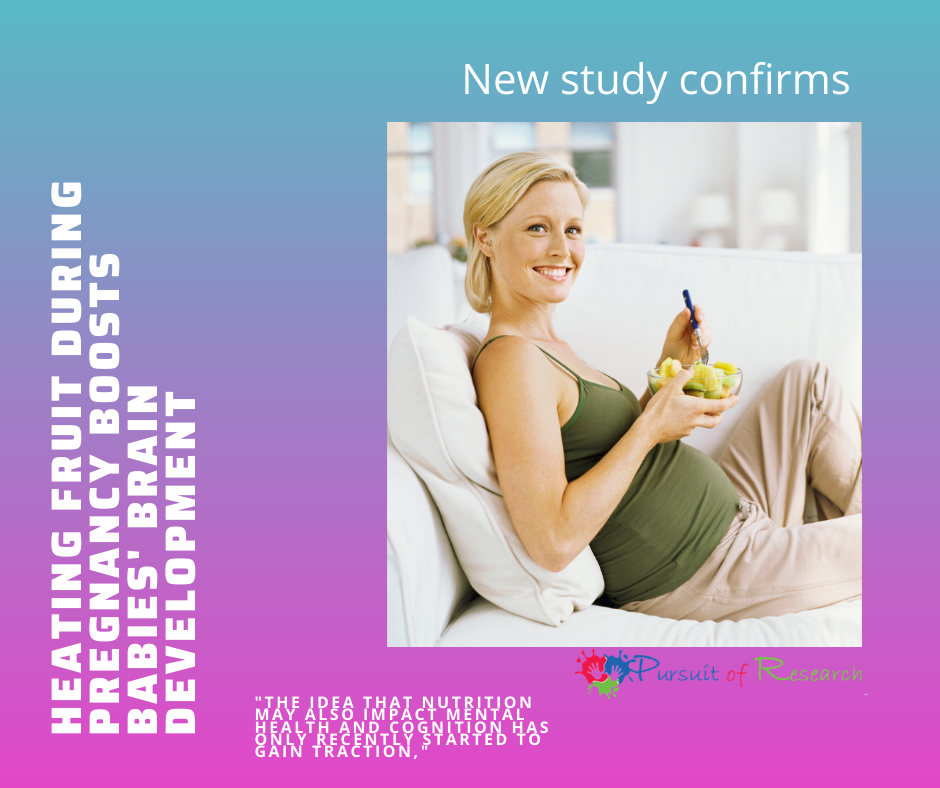” The idea that nutrition may also impact mental health and cognition has only recently started to gain traction,”
Rachel Ward-Flanagan co author of study University of Alberta

A follow-up to a University of Alberta study done in 2016 confirms that pregnant women who eat more fruit during pregnancy may be giving their babies’ cognitive development a boost.
“Our research followed up on results from the original CHILD Cohort Study, which found that fruit consumption in pregnant mothers influences infant measures of cognition up to one year after birth,” said U of A post-doctoral researcher in psychology Claire Scavuzzo, the co-lead author of the study.
“Although the findings from the (original) study were exciting, they could not establish that fruit consumption, rather than other factors, caused the improvements on infant cognition.”
To determine whether fruit was truly the factor influencing infant cognition, the scientists aimed to replicate the findings from the original study.
They found that infant rats born to mothers that had their diets supplemented with fruit juice performed significantly better on tests of memory—consistent with the previous study.
“Our findings replicated what was found in humans and fruit flies. In a controlled, isolated way, we were able to confirm a role for prenatal fruit exposure on the cognitive development of newborns,” explained Scavuzzo.
“We see this as especially valuable information for pregnant mothers, as this offers a non-pharmacological, dietary intervention to boost infant brain development.”
“The idea that nutrition may also impact mental health and cognition has only recently started to gain traction,” said co-lead author Rachel Ward-Flanagan. “People want to be able give their kids the best possible start in life, and from our findings, it seems that a diet enriched with fruit is a possible way to do so.”
A Ph.D. student studying under the supervision of Clayton Dickson, Ward-Flanagan embarked on the followup study with Scavuzzo in collaboration with pediatrics professors Francois Bolduc and Piushkumar Mandhane.
Dickson, Scavuzzo, Ward-Flanagan and Bolduc are part of the U of A’s Neuroscience and Mental Health Institute. Bolduc and Mandhane, are both members of the Women and Children’s Health Research Institute, which helped support the original study through funding provided by the Stollery Children’s Hospital Foundation and supporters of the Lois Hole Hospital for Women.
The study, “Prenatal Fruit Juice Exposure Enhances Memory Consolidation in Male Post-weanling Sprague-Dawley Rats,” was published in PLOS ONE.
More information: Rachel Ward-Flanagan et al. Prenatal fruit juice exposure enhances memory consolidation in male post-weanling Sprague-Dawley rats, PLOS ONE (2020). DOI: 10.1371/journal.pone.0227938 Journal information:PLoS ONE
LISA GENG
Author, Mom, Founder, and President of The Cherab Foundation
Lisa Geng is an accomplished author, mother, founder, and president of the CHERAB Foundation. She is a patented inventor and creator in the fashion, toy, and film industries. After the early diagnosis of her two young children with severe apraxia, hypotonia, sensory processing disorder, ADHD, and CAPD, she dedicated her life to nonprofit work and pilot studies. Lisa is the co-author of the highly acclaimed book “The Late Talker” (St Martin’s Press 2003). She has hosted numerous conferences, including one overseen by a medical director from the NIH for her protocol using fish oils as a therapeutic intervention. Lisa currently holds four patents and patents pending on a nutritional composition. She is a co-author of a study that used her proprietary nutritional composition published in a National Institute of Health-based, peer-reviewed medical journal.
Additionally, Lisa has been serving as an AAN Immunization Panel parent advocate since 2015 and is a member of CUE through Cochrane US. Currently working on her second book, “The Late Talker Grows Up,” she also serves as an executive producer of “Late Talkers Silent Voices.” Lisa Geng lives on the Treasure Coast of Florida.